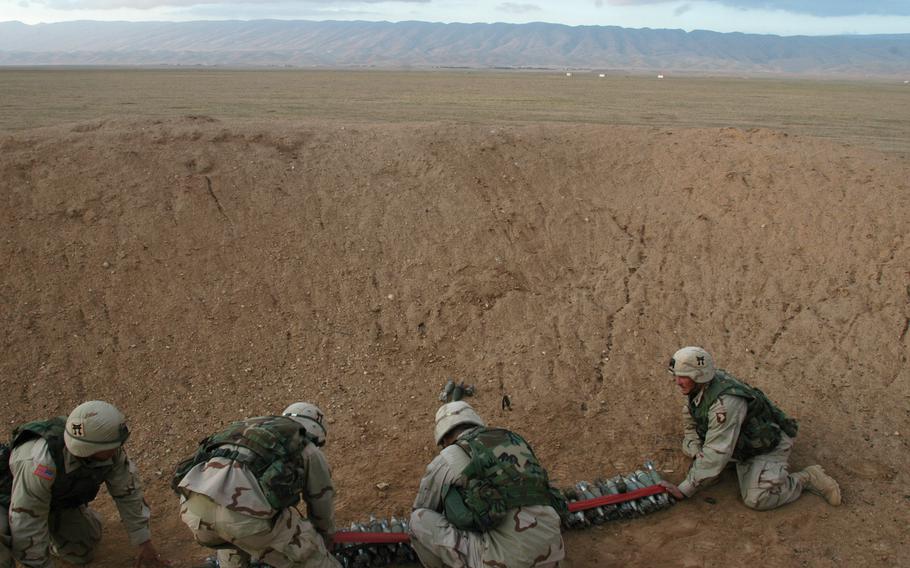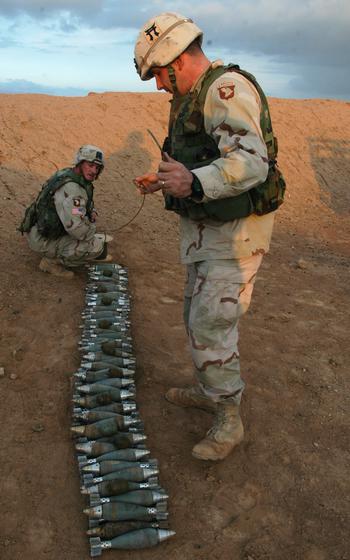
Combat engineers with Company C, 326th Engineering Battalion, attached to the 101st Airborne Division, prepare to detonate grenades and mortars in a mountainous area near Sinjar, Iraq. The weapons were turned in by nearby villagers. (Kendra Helmer/Stars and Stripes)
SINJAR, Iraq — Iraqis line up outside the gates of Range 54 daily, ready to hand over weapons in exchange for cash.
Just don’t call it a weapons buy-back program.
Under coalition guidelines, a weapons buy-back program is not allowed, said Lt. Col. Hank Arnold, commander for the camp’s 2nd Battalion, 187th Infantry Regiment, 3rd Brigade, 101st Airborne Division.
“What we call it is a ‘weapons reward program’ for guys that turn in caches,” said Arnold, 39, from Pensacola, Fla. “We can’t give you $20 per RPG [rocket-propelled grenade]; that’s a weapons buy-back program. What we can do is give you a reward for locating and helping us — find a cache.”
So nearby villagers collect a bunch of weapons that qualifies as a cache. About 40 Iraqis a week turn in loads of weapons to the camp in northern Iraq; half of them are members of the Coalition for Iraqi National Unity (CINU), said Capt. Jeff Csoka, assistant operations officer.

Sgt. Tim Jackowicz, 30, a combat engineer from Clarksville, Tenn., left; and Sgt. 1st Class Paul Dominguez, 39, a platoon sergeant from Hillside, N.J., prepare to wrap detonation cord around mortars and grenades near Sinjar, Iraq. (Kendra Helmer/Stars and Stripes)
The group, which says its purpose is to promote peace and unity among tribes and coalition forces, scours the area for weapons, Csoka said.
“On average, CINU turns in on a daily basis to us more weapons and ammunition than are seized through combat operations by the entire 101st Airborne Division in a day” Arnold said, based on news releases about what the division seizes.
From Nov. 10 through Dec. 6, weapons turned into the battalion included 105 RPG launchers, 1,082 RPG rounds, 17 anti-tank missiles, 10 surface-to-air missiles, 300 mortar rounds, 150 hand grenades and 10 machine guns.
“We’re trying to collect weapons that pose the greatest threat to coalition forces: RPGs, IEDs [improvised explosive devices, or bombs], surface-to-air missiles,” said Csoka, 29, from Medford, N.Y.
Combat engineers with Company C, 326th Engineering Battalion, attached to the 101st Airborne Division, destroy the weapons.
“We blow something up almost daily,” smiled Sgt. 1st Class Paul Dominguez, 39, platoon sergeant, as he wrapped detonation cord around a few dozen mortar rounds on a dirt berm. After the soldiers pulled the fuse igniter, they drove a safe distance and waited for the “boom.” One soldier videotaped the explosions to show his family.
Even though the detonations are a daily task for them, it’s still a thrill.
The battalion doesn’t reward Iraqis for turning in AK-47s and pistols because they’re so prolific, and prices for most weapons are not guaranteed. An RPG launcher fetches $10 to $40, and a hand grenade gets about $10. A complete surface-to-air missile system, though, draws a guaranteed $500. Over three months, Csoka estimated $10,000 had been rewarded.
Csoka said the money comes from whatever battalion funds are left over week’s end. Some of the cash comes from goods that forces have confiscated from smugglers sneaking across the Syrian border.
When an Iraqi turns in weapons, Csoka takes down the man’s name so he knows how much money to give him on Sunday, payday.
“I don’t question where they get them, I’m just happy they turn them in,” Csoka said.
Arnold agreed.
“Personally, I think it’s a wrong idea to say we’re not going to buy back weapons,” Arnold said. “The argument from the big guys is, ‘Well, if we start buying weapons, then we become part of the weapons market and people smuggle them in just to turn them into us for money.’ ”
But Arnold said, “Hey, they’re smuggling them anyway. I would much rather get an RPG rocket given to me that I bought for $20 with the safety pin in the nose than have the son of a bitch fly at me 300 feet per second with the safety pin out.”